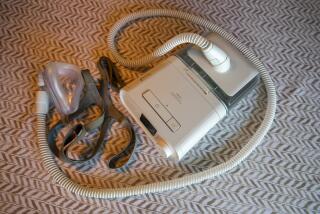Scope makers won’t testify but say they are working with FDA on superbug
- Share via
Reporting from Silver Spring, Md. — Olympus Corp. and two other manufacturers of medical scopes linked to a string of superbug outbreaks declined to speak Thursday at a Food and Drug Administration hearing on the deadly problem.
“They were invited to speak at this meeting but for various reasons they’ve declined to participate,” said Dr. Stephen Ostroff, the FDA’s acting commissioner, as he opened the two-day hearings at the agency’s headquarters in Maryland.
Ostroff added that the goal of the meeting was to assure doctors and their patients that the scopes could be used safely.
“Ultimately, this meeting is not about the device,” he said. “It’s about the patients.”
Mark Miller, a spokesman for Olympus, said executives are attending the meeting to gather information and the panel’s comments.
“We plan to share the information with our larger internal task force to inform our continued work with the FDA and other stakeholders,” Miller said. “The team will evaluate whether to provide written input” to the committee after the hearing.
And Andy Gilman, a spokesman for scope-maker Pentax, said the company was continuing to work with the FDA to address concerns relating to infections.
“Let’s be clear,” Gilman said, “patient safety is our No. 1 focus.”
In response to concerns about patient infections, the FDA convened an advisory panel Thursday and Friday to examine the use and cleaning of the scopes. The devices are used in a procedure called ERCP, or endoscopic retrograde cholangiopancreatography.
About 670,000 ERCP procedures were performed in the U.S. last year.
“As we address the problem of duodenoscope-associated infections,” Ostroff said, “we have to do so in a manner that doesn’t disrupt medical care.”
The panel of medical experts is expected to hear from federal health officials and hospital physicians who encountered outbreaks.
On Friday, the FDA panel will take up a number of recommendations to regulators related to cleaning practices, government oversight and public notification about potential harm from medical devices.
The FDA sent a nationwide alert to hospitals and doctors a day after The Times broke the news Feb. 18 about an outbreak at UCLA’s Ronald Reagan Medical Center.
The next month, regulators finalized new rules for cleaning reusable medical devices that had been in the works since 2011.
In Los Angeles, outbreaks from contaminated Olympus Corp. scopes have occurred at UCLA and Cedars-Sinai Medical Center hospital involving the superbug CRE.
At UCLA, seven patients were infected, including two who died. Cedars reported four patients were sickened with CRE.
There were similar patient infections at hospitals in Washington, Illinois and Pennsylvania.
Both the FDA and Olympus, the leading manufacturer of these duodenoscopes, have come under fire for not acting sooner to alert hospitals about the infection risk and taking steps to remedy the problem.
Olympus issued revised cleaning instructions for its scopes in March, and it has expressed sympathy to the patients infected.
Terhune reported from Silver Spring, Md., and Petersen from Los Angeles.
Twitter: @chadterhune, @melodypetersen
MORE
Story so far: What we know about scopes linked to deaths
More to Read
Inside the business of entertainment
The Wide Shot brings you news, analysis and insights on everything from streaming wars to production — and what it all means for the future.
You may occasionally receive promotional content from the Los Angeles Times.











